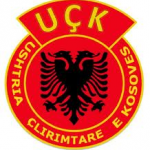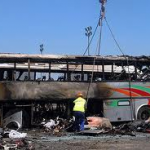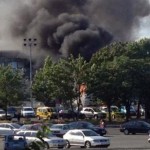This section will touch on a few countries in the Europe-Southeast Region and the terrorist attacks they have be faced with and how these countries rank on the Global Terrorism Index & the Global Peach Index.
Turkey (19th terrorismIndex/2.34 Global Peace Index)
Terorrist Groups within Turkey:
- The Kurdistan Workers’ Party, commonly known as the PKK, is a Kurdish organization which has been fighting an armed struggle against the country of Turkey for an independent Kurdistan state and for political rights for the Kurds in Turkey.
PKK
- Was founded by Abdullah Öcalan
- Founded in 1978, the group later transformed into a paramilitary group in 1984.
- PKK’s ideology was originally a fusion of revolutionary socialism and Kurdish nationalism.
- PKK is known internationally as a terrorist group by many states such as; NATO, United States and the European Union.
Notiable Terorrist Attacked of the PKK
- Suspected in the 2008 Diyarbakir bombing in Diyarbakir Turkey on 3 January, 2008.[1]
- About 110 people were injured during the attack, 5 being killed, including 3 children.
- Attack targeted military vehicles as they passed near a school.
- Suspected in the 2012 Gaziantep bombing in the city of Gaziantep Turkey, during the final days of the holy month of Ramadan.
- The bombing killed 10 people, including 4 children.
- PKK denied the attacks and claimed another Kurdish group; TAK was responsible for the attack.
The Capture of Abdullah Ocalam
- Ocalan was captured in 1999. Despite his incarnation, Ocalan is currently negotiating a truce with Turkey and rebel fighters will withdraw the country.
- Rebels will cross in Northern Iraq.
- “We have reached the point where the guns must be silenced and where ideas must speak. A new era has started, where it is politics, not guns, which is at the forefront.”[2]
Current New in Turkey
- According to The US State Department in its annual global terrorism report that Turkey was often used as a transit country in 2013 for foreign fighters seeking to join al-Qaeda and its affiliates in Syria. [8]
Serbia & Albania/Bosnia/Kosovo/Republic of Macedonia (76th terrorism Index/1.92 Global Peace Index)
Serbia experienced an increase in terrorist activities during the 1990’s, during the break out of the former Republic of Yugoslavia. Various terrorist attacks were conducted on government sites, and in conflicts leading the separation of the independent states of Bosnia, Kosovo, and Montenegro. Tensions between the provinces still exist, as in 2010 Kosovska Mitrovica attacks in Northern Kosovska Mitrovica refer to a number of incidents that occurred on July 2, September 11 and September 28 of 2010.
- An explosive device was thrown into a group of Serbs who were peacefully protesting against the Kosovo Albanians’ intention to open a governmental office in the area
- 1 person was killed and 11 were injured, no suspects were identified.
- Both Kosovo and Serbian authorities condemned the attack, July 3 was declared a day of mourning by North Kosovo.[3]
- Following a World Basketball Championship game where Turkey beat Serbia, Albanians from the South crossed the bridge and instigated a fight with Serbs of the North (7 injured).
- An explosion device destroyed a cell site of a mobile carrier that serviced Albanians. The roof space was rented out by a local Serb working for the Kosovo police.
- During the 1990’s, Serbia was initially a part of the Federal Republic of Yugoslavia. A war was fought with the Kosovo Albanian rebel group, and Kosovo Liberation Army (KLA).
- Prior the war, the KLA was considered United States and other countries as a terrorist group, until it was de-listed just before the United Nations become involved and help. Active from 1996-1999.[4]
- The KLA first attacks were a series of attacks against Yugoslav (Serbia) police stations and government offices.
- The KLA helped establish the independent state of the republic of Kosovo 2008.
Greece (26th Terrorism Index / 1.97 Global Peace Index)
Terrorist Groups in Greece
- Revolutionary Struggle
- Sect of Revolutionaries
- Conspiracy of Cells of Fire
These groups encourage revolution as a means to change government policy and structure. The most active group is Conspiracy of Cells of Fire Their ideology is they represent the “third pole” of anarchist in Greece.
These groups instigate many of the recent riots and protests throughout Greece in their current economic crisis.
Conspiracy of Cells of Fire (SPF)
- Formed in January 2008, started with firebombs against luxury car dealerships.[5]
- Arrests made in attempts to mail bombs to embassies and EU leaders.
- In November 2010, SPF attempted to mail parcel bombs to EU government offices in Germany and Italy, as well as foreign embassies in Greece. [10]
Revolutionary Struggle
- First emerged in 2003 with bombing attacks on a Athens courthouse.
- Claimed responisbility for a bomb attack that ocurred outside the Bank of Greece.
– attack was in response to Greece’s return to the international money market [9]
- A terrorist attack occurred on January 12, 2007, when a rocket propelled grenade was fired into United States’ embassy building in the country.
- No casualties were reported.
- 13 days later, Revolutionary Struggle announced in local news outlets they took responsibility for the attack.[6]

Bulgaria (82nd Terrorism Index / 1.69 Global Peace Index)
The country has not had any incidents with a group over the past several years. The country did experience a significant terrorist event in 2012 in a suspected terrorist attack by Hezbollah on Israeli tourists.
- On July 18, 2012 a bus carrying Israeli tourists was bombed outside the Burgas Airport, in Burgas Bulgaria; killing 7.[7]
- Hezbollah is suspected in conducted the attack, with the possibility of backing from Iran.
- A majority of the passengers were children.
- The Jewish Agency for Israel (JAFI) decided to include the family of the Muslim bus driver for finical aid to show solidarity of the Jewish people with their loss.
Croatia/Romania/Slovenia (116th Terrorism Index / 1.64 or lower Global Peace Index)
Over the past few years, the countries of Croatia, Romania, and Slovenia have enjoyed a good level of peace.
- No documented incidents of terrorism in the past several years.
- High rankings on the Global Peace Index.
[1] http://news.bbc.co.uk/2/hi/europe/7170195.stm
[2] http://news.yahoo.com/turkey-voices-caution-over-rebels-truce-call-144347317.html
[3] http://www.b92.net/eng/news/politics-article.php?yyyy=2010&mm=07&dd=02&nav_id=68188
[4] RT.com (http://rt.com/news/syrian-opposition-studies-terror-tactics-in-kosovo-585/)
[5] http://www.upi.com/Top_News/2008/02/22/Anarchists-claim-responsibility-for-arson/UPI-26531203730753/
[6] http://www.nytimes.com/2007/01/12/world/europe/12cnd-greece.html?_r=0
[7] CNN News (http://www.cnn.com/2012/07/18/world/europe/bulgaria-israel-blast)
[8] http://www.todayszaman.com/news-346593-us-terror-report-turkey-used-for-transit-by-radical-groups-in-syria.html







An explanation of the Peace Index and Terrorism Indexes would help the occasional reader understand what high and low mean in both contexts and what concepts and elements make up each of the indexes. Perhaps links to explanations for anyone that is trying to drill deeper into the understanding.